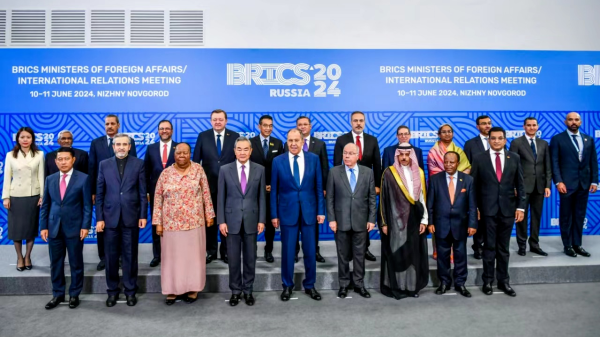China supports the BRICS countries in pursuing development with open doors and boosting cooperation with open arms, and it welcomes more like-minded partners to join the BRICS family, Chinese Foreign Minister Wang Yi said on Tuesday.
Wang, also a member of the Political Bureau of the Communist Party of China (CPC) Central Committee, made the remarks while attending the “BRICS Plus” dialogue at the foreign ministers’ level in the Russian city of Nizhny Novgorod.
Noting that the “BRICS Plus” dialogue is an important platform for BRICS countries and other emerging markets and developing countries, Wang said it has long added vitality and injected impetus into BRICS’ development.
The collective rise of emerging markets and developing countries has significantly advanced the process of creating a multipolar world, he said, adding that a large number of countries have embarked on the fast track of development and the Global South has become a new awakening force.
Wang put forward three proposals for developing countries to open up new opportunities amidst changes and crises.
Maintaining universal security
Wang called for upholding the principle of indivisible security, respecting the sovereignty and territorial integrity of all countries, and accommodating each other’s legitimate and reasonable concerns.
He urged political solutions to resolve hot-spot issues and called for resolving disputes through consultation and promoting security through cooperation to inject more stability into international affairs.
Regarding the Ukraine crisis, China stands on the side of fairness and objectivity and insists on promoting talks for peace, he said, adding that China advocates convening a true international peace conference recognized by Russia and Ukraine, with equal participation by all parties and fair discussion of all peace options when conditions are met.
On the Palestinian issue, Wang said China firmly stands with the Arab countries and strives for an immediate and permanent ceasefire in Gaza, urging the release of all detained persons and providing basic living conditions for the people of Gaza.
He urged efforts to resume the two-state solution as soon as possible to achieve the establishment of an independent Palestinian state.
Upholding development for progress
Wang called for opposing the politicization of economic issues and strengthening the alignment of development strategies and the coordination of macroeconomic policies.
Efforts must be made to maintain the stability and smooth flow of the global industrial and supply chains and promote globalization to develop in a more open, inclusive, balanced and win-win direction, he said.
Taking the UN Summit of the Future as an opportunity, he urged efforts to put development issues at the center of the international agenda and let development results benefit all countries.
Upholding fairness and justice
Only by adhering to the basic norms governing international relations can the world achieve steady and long-term progress, he stressed.
Wang said a global governance philosophy that emphasizes extensive consultation, joint contribution and shared benefits must be upheld, calling for safeguarding true multilateralism and promoting an equal and orderly multipolar world.
All parties attending the event spoke highly of the strategic significance of the dialogue, adding that the “BRICS Plus” model is conducive to promoting unity and cooperation among developing countries, enhancing the influence of the Global South and building a more just and reasonable international order.
All parties agreed to oppose unilateralism and hegemonism, insist on resolving conflicts and differences through dialogue and consultation, and achieve a ceasefire in Gaza at an early date.
The 10 BRICS countries carried out exchanges with 12 developing countries, including Thailand, Laos, Vietnam, Bangladesh, Sri Lanka, Kazakhstan, Belarus, Türkiye, Mauritania, Cuba, Venezuela and Bahrain.





